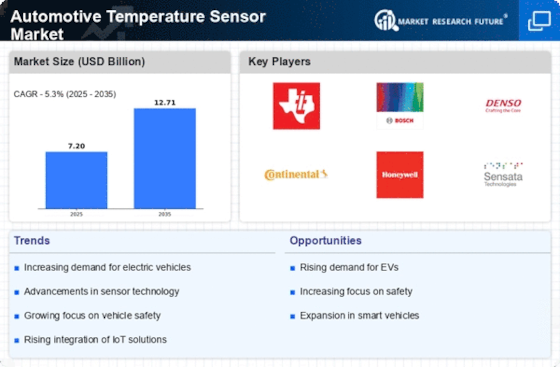Top Industry Leaders in the Automotive Temperature Sensor Market
*Disclaimer: List of key companies in no particular order
The Automotive Temperature Sensor Market is marked by its dynamic and highly competitive landscape, featuring a mix of established players and emerging entrants. Key players, such as Robert Bosch, Aptiv PLC, Continental, Panasonic, TDK Corporation, TE Connectivity Ltd, RoHM Co. Ltd., Microchip Technology Inc., TT Electronics, ZF TRW Automotive, RFMicron, and others, hold significant market share due to their established brand presence, robust product portfolios, and global reach.
Strategies Employed by Key Players:
Product Innovation: Leading companies continually innovate their product offerings to meet the evolving demands of the automotive industry. This involves developing sensors with higher accuracy, broader temperature ranges, and improved functionality for specific applications. For instance, Sensata Technologies introduced a new series of automotive temperature sensors with superior performance and reliability for harsh environments.
Mergers and Acquisitions: Strategic M&A activities play a crucial role in the growth strategies of key players, allowing them to acquire new technologies, expand product portfolios, gain access to new markets, and strengthen their competitive position. For example, NXP Semiconductors acquired OmniVision Technologies to enhance its capabilities in automotive applications.
Partnerships and Collaborations: Collaborations with automotive OEMs and Tier 1 suppliers are vital for sensor manufacturers to gain market share and integrate their products into new vehicle models. These partnerships also facilitate joint research and development efforts to drive innovation in automotive temperature sensor technology.
Geographic Expansion: Expanding into new geographical markets offers significant growth potential for major players. This involves establishing manufacturing facilities, building distribution channels, and forming relationships with local partners. For instance, Robert Bosch GmbH has actively expanded its presence in the Asia-Pacific region, a rapidly growing automotive market.
Factors for Market Share Analysis:
Product Portfolio: The breadth and depth of a company's product portfolio play a significant role in its market share. Companies with a diverse range of sensors catering to various applications tend to have a greater market presence.
Brand Reputation: Established brands with a strong reputation for quality, reliability, and innovation hold a significant advantage in the market. Customers are more likely to trust and choose temperature sensors from well-known brands.
Customer Service and Support: Providing excellent customer service and technical support is crucial for retaining existing customers and attracting new ones. This includes offering prompt technical assistance, efficient warranty services, and flexible customization options.
Manufacturing Efficiency: Cost-effective manufacturing processes and economies of scale allow companies to offer competitive pricing and maintain profitability. Efficient production also ensures a consistent supply and timely delivery of products.
Compliance with Regulations: Adherence to stringent regulations governing automotive safety and environmental standards is essential for market participation. Companies that consistently comply with regulations gain a competitive edge.
Emerging Trends:
Smart Sensors: The integration of sensors with microcontrollers and communication capabilities is driving the development of smart temperature sensors. These sensors offer advanced features like self-diagnostics, data analysis, and communication protocols, enabling real-time monitoring and control of systems.
Wireless Sensors: Wireless temperature sensors are gaining traction due to their ease of installation and maintenance-free operation, eliminating the need for complex wiring and providing flexibility in sensor placement.
MEMS Sensors: Microelectromechanical systems (MEMS) technology allows for the miniaturization of temperature sensors, offering significant advantages in size, weight, and power consumption, making them ideal for space-limited applications.
AI and Machine Learning: Integrating AI and machine learning algorithms into temperature sensors enables predictive maintenance and anomaly detection, allowing for proactive troubleshooting and preventing potential failures, reducing downtime and maintenance costs.
Overall Competitive Scenario:
The automotive temperature sensor market is anticipated to witness continued growth, driven by factors such as increasing vehicle electrification, rising demand for advanced driver-assistance systems (ADAS), and stringent emissions regulations. The competitive landscape is expected to remain dynamic, with established players and emerging entrants competing for market share. To stay ahead of the competition, companies will need to focus on innovation, strategic partnerships, geographical expansion, and efficient operations while adapting to the latest technological advancements.
Industry Developments and Latest Updates:
Robert Bosch (Germany):
- October 26, 2023: Announced a collaboration with Xsens to develop advanced in-vehicle sensor technologies for driver monitoring and occupant safety systems, potentially involving temperature sensors for monitoring driver alertness and comfort. (Source: Bosch press release)
Continental (Germany):
- December 5, 2023: Won a major contract from a European automaker to supply high-precision temperature sensors for electric vehicle battery packs, highlighting Continental's strong presence in the EV temperature sensor market. (Source: Continental website)
Aptiv PLC (U.K.):
- November 10, 2023: Partnered with NXP Semiconductors to develop high-performance radar and sensor technologies for autonomous vehicles, potentially including advanced temperature sensors for object detection and environmental monitoring. (Source: Aptiv press release)
Panasonic (Japan):
- November 3, 2023: Announced the development of a miniaturized temperature sensor for HVAC systems in vehicles, contributing to reducing vehicle weight and improving fuel efficiency. (Source: Panasonic website)











